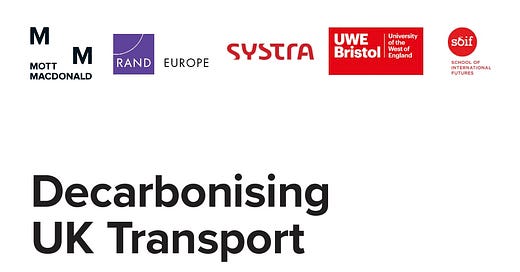Welcome to Just Two Things, which I try to publish daily, five days a week. Some links may also appear on my blog from time to time. Links to the main articles are in cross-heads as well as the story.
#1: Getting to net zero mobility
A guest post co-authored with Glenn Lyons and Charlene Rohr
How do you see the wood for the trees when embarking on the task of decarbonising direct emissions from transport across multiple modes in the UK?
The three of us are delighted to have authored one of the supporting documents to the UK Government’s Transport Decarbonisation Plan that has tried to provide the answer.
The report, by Mott MacDonald and its partners (RAND Europe, Systra, UWE Bristol and the School of International Futures), develops a set of seven roadmaps from 2020 to 2050 for the reduction and removal of direct emissions for cars and light goods vehicles, buses, coaches, rail, domestic shipping and domestic aviation.
We’ve co-written an article, linked here, which suggests ten take-away points:
1 It is possible to decarbonise road travel by 2050, but decarbonising domestic shipping and aviation will be more challenging
2 Battery technology is a key part of the decarbonisation story
3 Green Hydrogen could be integral to achieving full decarbonisation
4 Fleet turnover is an important factor in the pace for decarbonisation
5 There is a pressing need for infrastructure development
6 Decarbonisation of transport requires urgent action
7 There is a need for co-operation
8 There is substantial uncertainty
9 A need to monitor and adapt
10 The importance of systems thinking
The full report can be found here (pdf).
#2: The downsides of the Games
I realise this might just be me, but I’m finding it hard to love the Olympics this time around. It might be the time zone, although I remember enjoying the Beijing games in 2008. It might be the fact that a significant majority of Japanese people didn’t want the Games to happen, or the empty venues.
Of course, that at least means that spectators holding goods made by the competitors of the Games’ sponsors don’t have them removed at the gates of the venues by the stewards.
The question of whether the Tokyo Games would go ahead is a reminder that agreeing to host a games is a deal with the devil. As Helen Jefferson Lenskyj explained in The Conversation:
If anyone was unaware of the IOC’s use and abuse of power before 2020, events surrounding the Tokyo Olympics during the COVID-19 pandemic have shed unprecedented light on the organization’s iron grip over host cities and countries...
The host city contract for every Olympics states the IOC is the only party empowered to postpone or cancel the event. The contract has a weak “force majeure” clause that states “if the IOC has reasonable grounds to believe, in its sole discretion, that the safety of participants… would be seriously threatened or jeopardised for any reason whatsoever.”
Or my antipathy this time around might be that—however much I applaud an individual’s sporting excellence—that I can do without the lectures about what it means for Britain.
But I also wonder if the Olympics is losing its shine. An event can only absorb so much venality, after all. In a more politicised environment for professional sport, the Games is on the wrong side—not that it’s just about athletes:
The muzzling of free speech and freedom of assembly extends beyond athletes to residents of host countries and international visitors. The Olympic Charter overrides freedoms that are universally accepted in democracies by prohibiting protests in or near Olympic venues. These areas become de facto IOC territory for the duration of the Games.
And one of those signs that the IOC has a tin ear is represented by the vast pay-TV deal it’s done with Discovery for both this and the 2024 Olympic Games.
For most sports, this decision is usually a finely balanced one: pay-TV reduces the appeal of the sport to a wider public, while pumping money into it that the game can use to develop new talent or broaden the sport’s appeal, help smaller teams, or support its grassroots. For a sport like cricket, at least in the UK, the money helped do some of these things, but being on pay-TV hid the game from potential young players, and it’s now finding ways to get back onto free-to-air TV again.
But it’s not exactly clear what the IOC will do with the billions of dollars that it has been paid by Discovery. And impressions of the Games are certainly harmed by the fact that the there’s much thinner coverage on free-to-air television.
So this is a long way to point you to the Nolympicsla.com, a site that is protesting against the 2028 Los Angeles Games. The front page spells it out:
You can’t support both the Olympics and the Movement for Black Lives.
Here’s why. It’s time to #PickASide.
The site is a whole mass of resources, including critiques of the Tokyo Games and a whole lot of press material on the downsides of the Olympic Games in general. It’s worth a look.
Thanks to Peter Curry for the link to No Olympics LA.
j2t#139
If you are enjoying Just Two Things, please do send it on to a friend or colleague.




